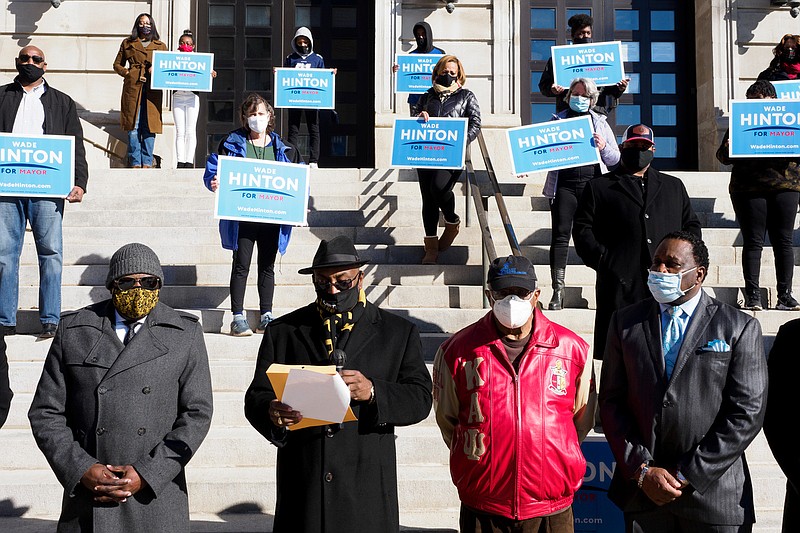Unless something dramatic changes, Chattanooga is not likely to have a Black mayor in 2021.
Yes, that's a blunt assessment that has nothing to do with the qualifications of the candidates running. It has more to do with the demographics of the city and the number of prominent Black candidates who are on the ballot.
Of the 15 candidates running for mayor, seven are Black, and five of those have more than also-ran name recognition. One is a former city attorney, two are current city councilmen, one is a former local president of the NAACP, and one is a business consultant.
According to the Census Bureau's latest American Community Survey, 31.4% of Chattanooga residents are Black. For a Black candidate to win the mayor's race without a runoff, he or she would need to have the support of every Black voter and slightly less than 19% of the city's white voters, who make up 57.3% of the electorate.
To get into a runoff between the top two finishers in the mayor's race, one Black candidate would need to siphon off votes from the other prominent Black candidates and pull votes away from the top two white candidates, former auto dealer Tim Kelly and former River City President Kim White, both of whom already have significant support.
It's not impossible for a Black candidate; it's just improbable.
That's why a group of Black Chattanooga ministers and residents announced their support Monday for Wade Hinton, a former city attorney. It was the observed birthday of civil rights leader Dr. Martin Luther King Jr., but it's also getting late in the game. The election on March 2 is in a month and a half; early voting starts Feb. 10.
The thinking is that by getting in front of Hinton, they may draw some of those voters who otherwise might support businessman Monty Bruell, Councilman Russell Gilbert, Councilman Irvin Oglesby or former NAACP President Elnora Woods.
The group supporting Hinton included former state Rep. Joanne Favors, former city Councilman John "Duke" Franklin, former Hamilton County Board of Education member Dr. Jeffrey T. Wilson, former mayoral candidate Irvin Overton, and ministers at some of the city's larger Black churches.
A recent mayor's race poll sponsored by Hamilton Flourishing gave Hinton 8.9% of the vote, behind Kelly and White but several points ahead of the next Black contender. However, two things were significant from the poll: 36.1% of respondents - more than the percentage for any candidate - were undecided, and the other Black candidates together had almost twice the percentage Hinton did.
Turnout also will almost certainly play a key role in the race. While turnout in November's presidential election across Hamilton County was 73.05%, turnout in the 2017 mayor's race across Chattanooga was only 19.69%.
Of course, no Chattanooga mayor's race this century has drawn even half the interest the November election did. Previously, turnout for mayoral elections was 31.80% in 2001 (when businessman Bob Corker was elected over 11 opponents without a runoff), 26.95% in 2005 (when Councilman Ron Littlefield was elected in a runoff), 18.09% in 2009 (when Littlefield was re-elected), and 16.39% in 2013 (when Chattanooga Mayor Andy Berke was first elected with little opposition).
We said at the outset that unless something dramatic changes, Chattanooga is unlikely to have a Black mayor in 2021.
But, could something dramatic happen?
The ballot for the March election is set, so no candidate can drop out without having his or her name on the ballot. But if several Black candidates consider their chances and realize they have no chance of being elected but want to get a Black candidate in the runoff, they can publicly say they are leaving the race and all support one candidate.
If that were to be the case, all bets would be off. With the exception of fringe candidates, the electorate would be split three ways among Kelly, White and whichever prominent Black candidate is supported. Since Kelly and White will receive Black votes and the remaining Black candidate receive white votes, the top two vote-getters for a runoff would be up in the air.
This, of course, also precludes Kelly or White pulling a Corker and winning without a runoff.
It's regrettable in this truncated election season that the coronavirus pandemic will keep large audiences from seeing and hearing the mayoral candidates - in person - in the same forum. The race will likely have several gatherings with some or all candidates via Zoom, but the audiences for these online formats are not likely to resemble - from either audience attention span or participation - those in person.
In that case, we hope voters will seek out nonpartisan voter guides, visit candidates' websites and tune in to whatever candidate forums are available to inform themselves about the best candidate for the job. Chattanooga, like the U.S., was thriving before the global pandemic, and voters must choose carefully who they want to guide the Scenic City as it emerges on the other side.
